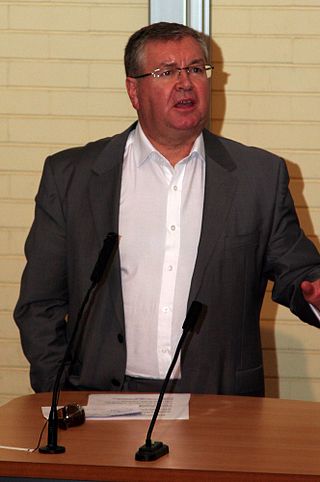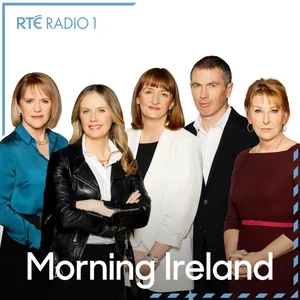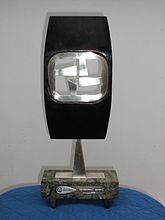
Gabriel Mary Byrne was an Irish presenter and host of radio and television. His most notable role was as the first host of The Late Late Show over a 37-year period spanning 1962 until 1999. The Late Late Show is the world's second longest-running chat show. He was affectionately known as "Uncle Gay", "Gaybo" or "Uncle Gaybo". His time working in Britain with Granada Television saw him become the first person to introduce The Beatles on-screen, and Byrne was later the first to introduce Boyzone on screen in 1993.

Joseph Duffy is an Irish radio and TV presenter employed by RTÉ. One of the public service broadcaster's highest-earning stars, he is the current presenter of Liveline, an interview and phone-in chat show broadcast on RTÉ Radio 1 on Mondays to Fridays between 13:45 and 15:00.

Prime Time is an Irish current affairs television programme airing on RTÉ One on Tuesday and Thursday nights.
RTÉ News and Current Affairs, also known as RTÉ News, is the national news service provided by Irish public broadcaster Raidió Teilifís Éireann. Its services include local, national, European and international news, investigative journalism and current affairs programming for RTÉ television, radio, online, podcasts, on-demand and for independent Irish language public broadcaster TG4. It is the largest and most popular news source in Ireland – with 77% of the Irish public regarding it as their main source of both Irish and international news. It broadcasts in English, Irish and Irish Sign Language. The organisation is also a source of commentary on current affairs. The division is based at the RTÉ Television Centre in Donnybrook, Dublin; however, the station also operates regional bureaux across Ireland and the world.

Morning Ireland is an Irish breakfast news programme broadcast by RTÉ Radio 1 and is noted as the country's most listened to radio programme. It is broadcast each weekday morning between 07.00 and 09.00 and alternate items are normally presented by two presenters from the current rota, which included Audrey Carville, Rachael English, Gavin Jennings and Fran McNulty as of Cathal Mac Coille's retirement in 2017. Occasional weekend editions are also aired on the occasion of major breaking news stories such as general elections, referendums or important news events.
Michael James Murphy is an Irish broadcaster, actor and property developer. He is best known for his long broadcasting career with RTÉ, presenting many TV shows such as The Live Mike, Winning Streak and The Big Interview.
Derek Davis was an Irish broadcaster. On television, he co-hosted Live at 3, presented Davis at Large and Out of the Blue and won Celebrity Bainisteoir.
John Skehan was a prolific broadcaster on RTÉ, radio and television, for four decades.
Doireann Ní Bhriain is an Irish independent radio producer. She began her career as a radio and television journalist, and started out reading children's stories on television. From those beginnings, she went on to work for the Irish broadcaster RTÉ for over 20 years before moving on in 1993. She is best known for her work and affiliation with RTÉ Radio 1.
Desmond Cahill is an Irish sports presenter and commentator with national broadcaster Raidió Teilifís Éireann. From 2009 to 2022, Cahill presented RTÉ television's GAA highlights programme The Sunday Game.
Evelyn O'Rourke is an Irish broadcaster employed by RTÉ
Nighthawks was an Irish television series broadcast on Network 2. Shay Healy presented. It was part of the major re-brand of RTÉ Two as Network 2 in 1988.

The Gay Byrne Show was an Irish radio programme, which ran from 1973 until 1998. The programme was presented by Gay Byrne, and aired Monday to Friday for two hours each day. It was a favourite of Irish housewives. Before Byrne's retirement in 1998, he was helped by Gareth O'Callaghan and then Des Cahill. Future Labour Party face Alex White edited the show for four years.
Live at 3 is a popular Irish afternoon chat show broadcast live on RTÉ 1. Presented by Thelma Mansfield and Derek Davis, it was RTÉ's flagship daytime show from 1986 until 1997. Ireland's most successful Daytime TV programme, reaching audiences of 300,000 at times, both young and old. The Monday edition was produced for older viewers and evolved from "Going Strong" presented by Bunny Carr. Its theme music was 'Arlecchino' by Rondò Veneziano.
RTÉ One is an Irish free-to-air flagship television channel owned and operated by RTÉ. It is the most-popular and most-watched television channel in the country and was launched as Telefís Éireann on 31 December 1961, it was renamed RTÉ in 1966, and it was renamed as RTÉ 1 upon the launch of RTÉ 2 in 1978. It is funded partly by the government's licence fee; the remainder of the funding is provided by commercial advertising. Because RTÉ is funded partly by the licence fee it shows considerably fewer advertisements than most other channels available in Ireland and Northern Ireland.
The following is a list of events relating to television in Ireland from 1962.
Insurrection is an Irish docudrama written by Hugh Leonard and directed by Michael Garvey and Louis Lentin. It was first broadcast on Telefís Éireann in Ireland on 10 April 1966 and later on the BBC in the United Kingdom, ABC in Australia and several other European countries. Only one series of eight episodes was made, with each episode broadcast on consecutive nights. The series was repeated only once when, on 1 May 1966, it was shown in its entirety.

Thomas Patrick "Tom" McGrath was a television producer at RTÉ Television, Ireland's national broadcaster. He is known for "pioneering" The Late Late Show in 1962, and selecting Gay Byrne to host the show. He was also credited with introducing Terry Wogan and Mike Murphy's first television series. He chose the song "All Kinds of Everything" for the 1970 National Song Contest, and selected Dana to sing it. It won both the national final therefore becoming Ireland's entry, and went on to win the 1970 Eurovision contest. He later produced and directed Ireland's staging of the 1971 Eurovision contest.






